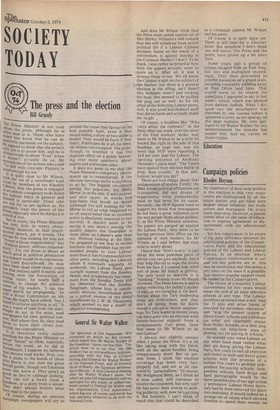The press and the election
Bill Grundy
The Prime Minister is not mad al?out the press, although he is 2it_en mad at it. Those who have Heard him know that he can be Positively paranoiac on the subject.
appears to think that the press's
ly job is to praise him, and he is 9iways ready to shout "Foul" when it doesn't 'actually do so. He ,r,eiMnds me of the actress who cried T0 hell with criticism. Flattery is goodenough for me." .It is quite clear to Mr. Wilson, with the aid of a viewfinder kept clean. k met, y members of the Kitchenthat the press is engaged In an unholy conspiracy to do down tt.!!e Labour Party in general and IIIIriself in particular. Those who are not for us are against us. He entunely fears the power of the Press, especially since he thinks it is aimed at him. , But in reality the Prime Minister has very little to worry about. StanleY Baldwin, in that m uchquoted speech, got it wrong. The phrase he was looking for was not _PoWer without responsibility" but without power, without responsibility." For the Press is about as much good at political persuasion as a eunuch would be at copulation. Ask Lord Beaverbrook. He may have been dead these many years but that restless spirit is surely still ft,..11triing. with the frustration of "." Pg. vainly, for nearly half a c.„ ,-riturY, to -change the political ; "'evys of hip readers. "I ran the Paper purely for propaganda," he LPN a Royal Commission on tffe c".ess. He might have added, "but I 'ailed to achieve anything at all." It as a waste of time from the start. reoPle do not, in the main, read ,newspapers for their political conLent. „ And where they do, they read c`fletti to have their views con'irrned, not contradicted.
It is therefore really rather
Pointless for the Prime Minister to _Shout "Smear" so often, especially Defore the event, as he did at Portsmouth. I suppose he believes ttlat thrown mud sticks. Well, yes, hitt it sticks to the hands of those
throw it, too. And the great
zntish public, though not Einstems enverY one, know it. They aren't as .;,r,een as they're cabbage looking, they can tell a hawk from a „,11andsaw, or a story from a smear. they don't always believe what they read in the papers. Of course, during an election campaign, newspapers will try to
present the cause they favour in the best possible light, even if that means hiding a story or two under a bushel. They would be fools if they didn't. Politicians do it all the time, Mr Wilson not excepted. The point, though, is whether it has the slightest effect on a public becoming ever more apathetic about papers and politicians alike.
It does not seem to me that the Prime Minister's conspiracy theory stands up to examination, if the election coverage so far is anything to go by. The biggest circulation among the populars, the Daily Mirror, is on his side. It says so over and over again, in words and type-faces that brook no denial (although I'm still waiting for the Mirror to tell us what happened to its oft-stated belief that an incomes policy is absolutely essential to our survival. It doesn't seem to be saying it any more.) Among the quality papers the Guardian is more often on Labour's side than not. Without looking at the files, I'm prepared to bet that in recent elections the Guardian has recommended people to vote Labour more than it has recommended any other party, including the Liberals whom it nominally supports. At weekends, the Labour Party gets outright support from the Sunday People, and scrupulously fair treatment from the Sunday Times and the Observer. And the Sunday Telegraph, whose bias is consistently obvious, nevertheless gave us a potted version of the party manifestoes by J. W, M. Thompson which seemed to me a model of objective summarising.
































 Previous page
Previous page